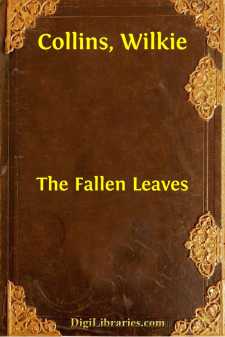Categories
- Antiques & Collectibles 13
- Architecture 36
- Art 48
- Bibles 22
- Biography & Autobiography 813
- Body, Mind & Spirit 142
- Business & Economics 28
- Children's Books 17
- Children's Fiction 14
- Computers 4
- Cooking 94
- Crafts & Hobbies 4
- Drama 346
- Education 46
- Family & Relationships 57
- Fiction 11829
- Games 19
- Gardening 17
- Health & Fitness 34
- History 1377
- House & Home 1
- Humor 147
- Juvenile Fiction 1873
- Juvenile Nonfiction 202
- Language Arts & Disciplines 88
- Law 16
- Literary Collections 686
- Literary Criticism 179
- Mathematics 13
- Medical 41
- Music 40
- Nature 179
- Non-Classifiable 1768
- Performing Arts 7
- Periodicals 1453
- Philosophy 64
- Photography 2
- Poetry 896
- Political Science 203
- Psychology 42
- Reference 154
- Religion 513
- Science 126
- Self-Help 84
- Social Science 81
- Sports & Recreation 34
- Study Aids 3
- Technology & Engineering 59
- Transportation 23
- Travel 463
- True Crime 29
Wilkie Collins
Wilkie Collins was a prominent English novelist and playwright of the Victorian era, best known for pioneering the detective fiction genre with works like "The Woman in White" (1859) and "The Moonstone" (1868). His intricate plots, memorable characters, and innovative narrative techniques significantly influenced contemporary and later literature. Collins was also a close friend of Charles Dickens, with whom he collaborated on several literary projects.
Author's Books:
Sort by:
by:
Wilkie Collins
CHAPTER I. THE SMUGGLED SUPPER. Outside the bedroom the night was black and still. The small rain fell too softly to be heard in the garden; not a leaf stirred in the airless calm; the watch-dog was asleep, the cats were indoors; far or near, under the murky heaven, not a sound was stirring. Inside the bedroom the night was black and still. Miss Ladd knew her business as a schoolmistress too well to...
more...
by:
Wilkie Collins
THE PROLOGUE I The resistless influences which are one day to reign supreme over our poor hearts, and to shape the sad short course of our lives, are sometimes of mysteriously remote origin, and find their devious ways to us through the hearts and the lives of strangers. While the young man whose troubled career it is here proposed to follow was wearing his first jacket, and bowling his first hoop, a...
more...
by:
Wilkie Collins
Let me begin by informing you, that this new novel does not present the proposed sequel to my last work of fiction—"The Fallen Leaves." The first part of that story has, through circumstances connected with the various forms of publications adopted thus far, addressed itself to a comparatively limited class of readers in England. When the book is finally reprinted in its cheapest form—then,...
more...
by:
Wilkie Collins
The 10:15 train glided from Paddington May 7, 1847. In the left compartment of a certain first-class carriage were four passengers; of these two were worth description. The lady had a smooth, white, delicate brow, strongly marked eyebrows, long lashes, eyes that seemed to change colour, and a good-sized, delicious mouth, with teeth as white as milk. A man could not see her nose for her eyes and mouth;...
more...
by:
Wilkie Collins
FIRST SCENE.—The Cottage on the Frontier.PREAMBLE.THE place is France. The time is autumn, in the year eighteen hundred and seventy—the year of the war between France and Germany. The persons are, Captain Arnault, of the French army; Surgeon Surville, of the French ambulance; Surgeon Wetzel, of the German army; Mercy Merrick, attached as nurse to the French ambulance; and Grace Roseberry, a...
more...
by:
Wilkie Collins
CHAPTER I In the year 1860, the reputation of Doctor Wybrow as a London physician reached its highest point. It was reported on good authority that he was in receipt of one of the largest incomes derived from the practice of medicine in modern times. One afternoon, towards the close of the London season, the Doctor had just taken his luncheon after a specially hard morning's work in his...
more...
by:
Wilkie Collins
A FAIR PENITENT Charles Pineau Duclos was a French writer of biographies and novels, who lived and worked during the first half of the eighteenth century. He prospered sufficiently well, as a literary man, to be made secretary to the French Academy, and to be allowed to succeed Voltaire in the office of historiographer of France. He has left behind him, in his own country, the reputation of a lively...
more...
by:
Wilkie Collins
THE OVERTURE. Day of the month and year, November the thirtieth, one thousand eight hundred and thirty-five. London Time by the great clock of Saint Paul’s, ten at night. All the lesser London churches strain their metallic throats. Some, flippantly begin before the heavy bell of the great cathedral; some, tardily begin three, four, half a dozen, strokes behind it; all are in sufficiently near...
more...
by:
Wilkie Collins
CHAPTER I In the first part of ROBINSON CRUSOE, at page one hundred and twenty-nine, you will find it thus written: "Now I saw, though too late, the Folly of beginning a Work before we count the Cost, and before we judge rightly of our own Strength to go through with it." Only yesterday, I opened my ROBINSON CRUSOE at that place. Only this morning (May twenty-first, Eighteen hundred and fifty),...
more...
by:
Wilkie Collins
OVER THE WAY I had been living at Tunbridge Wells and nowhere else, going on for ten years, when my medical man—very clever in his profession, and the prettiest player I ever saw in my life of a hand at Long Whist, which was a noble and a princely game before Short was heard of—said to me, one day, as he sat feeling my pulse on the actual sofa which my poor dear sister Jane worked before her spine...
more...











